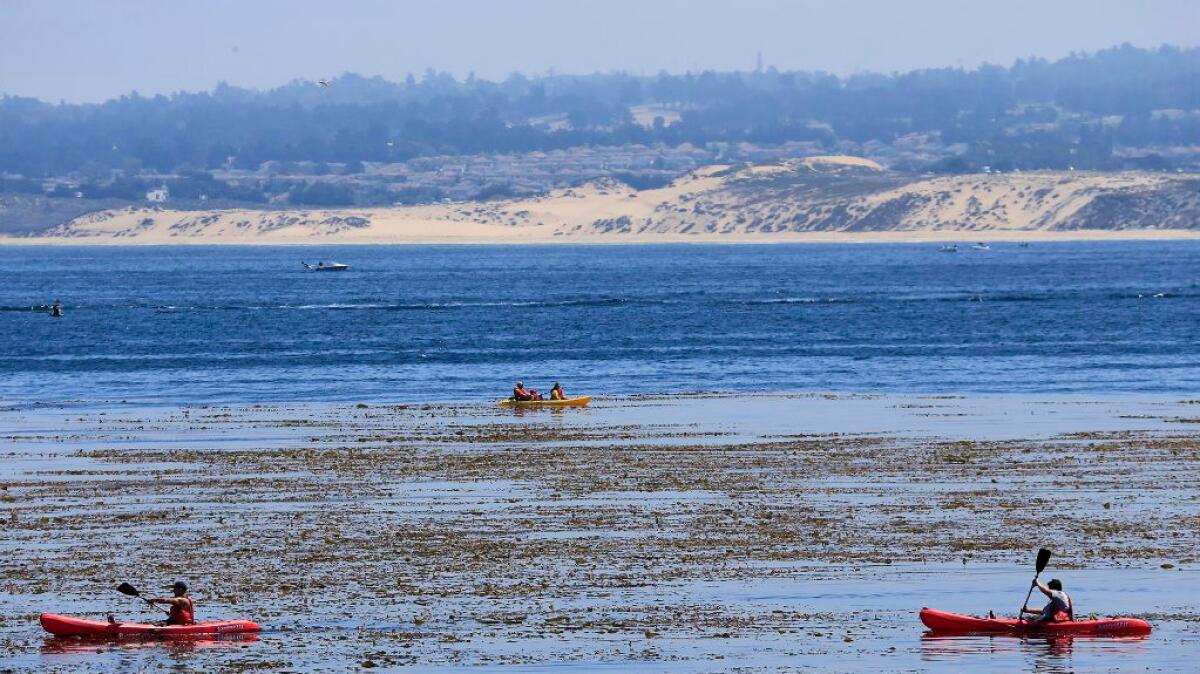Lawmakers weaken bill to ban behind-the-scenes communications at Coastal Commission

- Share via
A stalled bill to prohibit behind-the-scenes communications at the California Coastal Commission survived in the Legislature Thursday, but lawmakers weakened it with amendments that would allow the controversial practice to continue for developers and elected officials.
The Assembly Appropriations Committee decided to release a measure by Sen. Hannah-Beth Jackson (D-Santa Barbara) from the “suspense file” where pending bills are shelved, at least temporarily, if they cost the state $150,000 or more a year.
They created a negative bill that is hostile to the public but is pro-developer.
— Sara Wan, a former coastal commissioner
The bill, however, emerged from the committee with five amendments, including one that would — in effect — allow private ex parte communications to take place between developers and coastal commissioners during visits to project sites.
Another revision would let commissioners continue to have ex partes with elected officials, who are acting in their official capacity.
As amended, the ban would remain in place for environmental groups, government officials who are not elected, lobbyists and any other member of the public interested in a matter pending before the commission.
“I am concerned that several of the amendments may have departed from the intent and purpose of this bill, which was to curb lobbyist and developer influence, level the playing field for all Californians and restore transparency and trust in the Coastal Commission,” said Jackson, who cautioned that she has not seen the final versions of the changes.
The bill returns to the Assembly, but Jackson added that she will decide whether to withdraw the measure after reviewing the language of the amendments.
The original legislation would have banned commissioners from having any ex-parte communication with developers, lobbyists, environmentalists or other interested person.
Ex partes are private communications between a coastal commissioner and an interested party that could influence a decision. They can involve telephone calls, face-to-face meetings, emails or other written material.
Jackson has said the ban is necessary to promote open government, remove the possibility of backroom deal-making and help restore confidence in the commission since Executive Director Charles Lester was fired in February with little public explanation.
Her bill also would have prevented the coastal commissioners from trying to influence the agency’s staff in the preparation of reports and recommendations related to commission business.
The provision was designed to maintain the independence of the staff, which is supposed to objectively evaluate projects and proposals free of political influence.
Members of the appropriations committee, however, amended the bill, eliminating the ban but requiring the commission to adopt a policy prohibiting undue influence. In another change, they called on the commission to provide telephone and video access so members of the public could testify during public hearings.
“They turned a good bill into a bad one that will be disastrous for the commission,” said Sara Wan, a former coastal commissioner who supported the measure. “They created a negative bill that is hostile to the public but is pro-developer.”
State officials say that it’s difficult at this stage in the process to identify who on the committee proposed amendments to any bill or why.
Jackson’s bill, which was endorsed by the coastal commission, passed the Senate un-amended earlier this year. It was placed in the Assembly suspense file on Aug.1 after a report by the state Natural Resources Agency concluded that the measure might cost the commission about $900,000 a year to hire additional staff needed to gather information from interested parties for commissioners.
The report reached that conclusion although at least four other studies by the Legislature and the Coastal Commission indicated that an ex-parte ban would have no financial impact and, in some cases, might save money.
The analysis by the resource agency also supported the argument by some commissioners that ex-parte communications are a valuable source of information for them and a way to make commissioners accessible to the public.
However, some current and former coastal commissioners have questioned the value of ex-parte communications and the need for extra staff because the same information can be presented in staff reports and at the commission’s public hearings.
Follow me on Twitter at @LADeadline16
ALSO
Gun and video may provide answers in Jesse Romero shooting, police say
Probation statistics show increase in use of force at L.A. County juvenile halls
State is years behind on projects to protect wildlife at Salton Sea, officials and activists say
More to Read
Sign up for Essential California
The most important California stories and recommendations in your inbox every morning.
You may occasionally receive promotional content from the Los Angeles Times.











